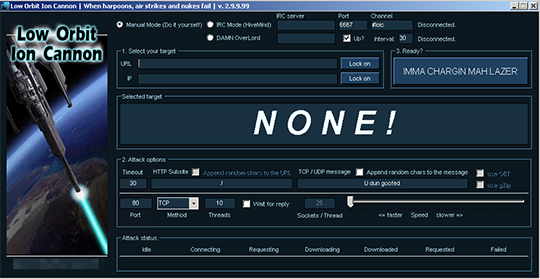HackTool.MSIL.LOIC.A
HackTool:Win32/Oylecann.A (Microsoft), HackTool.MSIL.Loic.f (Kaspersky), Application.Hacktool.BA (FSecure), HackerTool/MSIL_Loic (Fortinet), MSIL/HackTool.LOIC.AA (Nod32), SPR/MSIL.LOIC.F (AntiVir)
Windows 2000, XP, Server 2003


Threat Type: Hacking Tool
Destructiveness: No
Encrypted: No
In the wild: Yes
OVERVIEW
This Hacking Tool may be manually installed by a user.
TECHNICAL DETAILS
Arrival Details
This Hacking Tool may be manually installed by a user.
Other Details
This Hacking Tool does the following:
- It launches a denial of service (DoS) attack to a specified URL/IP by the user.
- The following image is a view of its graphical interface containing various options for DoS attacking.

SOLUTION
Step 1
Before doing any scans, Windows 7, Windows 8, Windows 8.1, and Windows 10 users must disable System Restore to allow full scanning of their computers.
Step 2
Identify and terminate files detected as HackTool.MSIL.LOIC.A
- Windows Task Manager may not display all running processes. In this case, please use a third-party process viewer, preferably Process Explorer, to terminate the malware/grayware/spyware file. You may download the said tool here.
- If the detected file is displayed in either Windows Task Manager or Process Explorer but you cannot delete it, restart your computer in safe mode. To do this, refer to this link for the complete steps.
- If the detected file is not displayed in either Windows Task Manager or Process Explorer, continue doing the next steps.
Step 3
Scan your computer with your Trend Micro product to delete files detected as HackTool.MSIL.LOIC.A. If the detected files have already been cleaned, deleted, or quarantined by your Trend Micro product, no further step is required. You may opt to simply delete the quarantined files. Please check the following Trend Micro Support pages for more information:
Did this description help? Tell us how we did.


